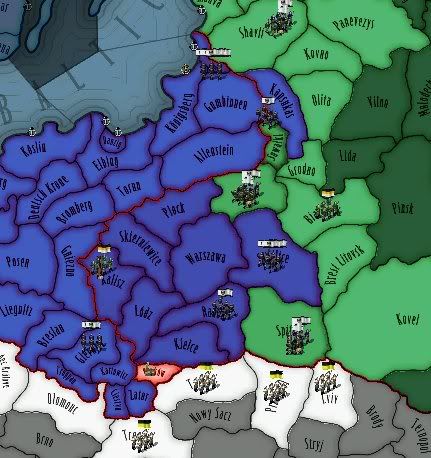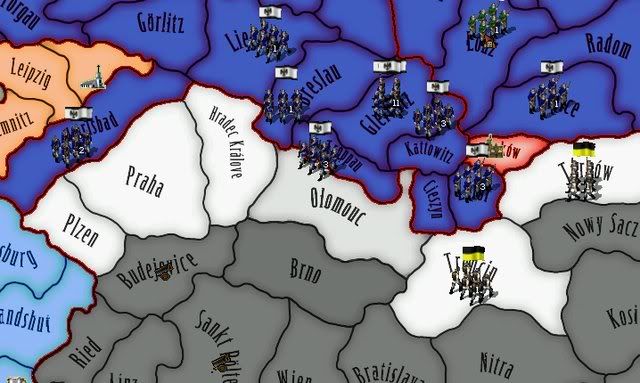1844: Communication Problems
The Russians may well have been able to hold off the Prussian general offensive, or at least slow down how things fanned out in actuality, but it was obvious that Prussian technological and organisational superiority was becoming a much more important factor in turning the tide against the Russian hordes. Prussian forces acted in sync with each other, were able to use more troops successfully and struck in the right places. The Prussians seemed like a proper army, an oiled machine of war that worked perfectly; the army with a nation.
The same could not be said of the Russians. Their commanders proved so inflexible to the point of not communicating with one another. Divisions went astray, sometimes for better but most times for worse, disallowing the high command to utilise the full might of the Russian 'steam-roller'. And these communication problems showed, very clearly. On the Vistula, both of Chicherin's Corps commanders refused point blank to send each other information on both theirs and the enemy’s situation, leaving Chicherin blind to the flanking move being taken out on him. The situation was the same in Poland. The force of 20,000 men ousted from Kalisz by von Wrangel's advance retreated into Silesia, the place they knew they would find other Russian forces. This seemed a sound idea, but Vorontsov, the commander of Russian forces in Silesia, had not seen fit to tell that corps that he was already being engaged by a force three times their number. And of course, both Vorontsov and the Polish Corps ignorance of the fact that they were in the process of being cut off did little to help the situation. It was clear that Russian high command was falling apart now that they were being engaged everywhere at once. They themselves were in the process of being 'Steam-rolled'.
This all helped the Prussians enormously. With over 90,000 men being pumped into breaking the stalemate on the Vistula's southern sector, a break through was bound to be made, and then Chicherin, still unaware of the dire situation he was in, would be surrounded. And in Silesia, more and more Russian forces retreated to the nearest army in Gleiwitz, strengthening the line there and simply allowing more time for von Wrangel to take Lodz, something that seemed almost inevitable now, and complete the encirclement of the entire Russian Silesian Army Group. It was now all a question of time before the Russians lost 11 of the 17 divisions fighting.
From a near stalemate in May, that things began to free up as soon as June was a surprise even to Berlin. The Russian forces in the southern Vistula section of the front broke into a rout on June 17th, at the same time that von Wrangel entered Lodz without having fought a battle and the Russian centre around Skierniewice broke leaving an open road to Warsaw. Things moved quickly on from there. On July 1st, Prussian Dragoons entered Königsberg, completing the encirclement of what remained of Chicherin's first Corps, and by July 7th, the Prussians had successfully taken Allenstein and Memel and had forced 40,000 Russians out of Gumbinen, making for the quickest advance of an army in history up to that point. Over 110,000 Russians troops were surrounded.
There was little of note considering battles. By this point, Russian troops were constantly on the back foot and never possessed the morale to put up more than a day or so resistance too Prussian forces. On August 5th, Chicherin surrendered his command, loosing the Russians 3 cavalry and 1 infantry division. Two days later, Vorontsov surrendered in Gleiwitz, loosing another 7 divisions. A day after that, the remains of the Russian defenders of Kielce, about 5,000 men of two battle weary divisions surrendered to von dem Knesebeck. Prussian troops entered Warsaw unopposed and easily handed off a small counterattack. By the end of August, the 22nd to be exact, the first Prussian troops entered Lithuania. The war looked more than one. Now it was a question of what to demand and how badly the Gendarme deserved to be crushed for its insults to Prussian liberalism, and how Europe would take such a backslash to the 'Balance of Europe'.

The front line, September 1st, 1844
The Russians may well have been able to hold off the Prussian general offensive, or at least slow down how things fanned out in actuality, but it was obvious that Prussian technological and organisational superiority was becoming a much more important factor in turning the tide against the Russian hordes. Prussian forces acted in sync with each other, were able to use more troops successfully and struck in the right places. The Prussians seemed like a proper army, an oiled machine of war that worked perfectly; the army with a nation.
The same could not be said of the Russians. Their commanders proved so inflexible to the point of not communicating with one another. Divisions went astray, sometimes for better but most times for worse, disallowing the high command to utilise the full might of the Russian 'steam-roller'. And these communication problems showed, very clearly. On the Vistula, both of Chicherin's Corps commanders refused point blank to send each other information on both theirs and the enemy’s situation, leaving Chicherin blind to the flanking move being taken out on him. The situation was the same in Poland. The force of 20,000 men ousted from Kalisz by von Wrangel's advance retreated into Silesia, the place they knew they would find other Russian forces. This seemed a sound idea, but Vorontsov, the commander of Russian forces in Silesia, had not seen fit to tell that corps that he was already being engaged by a force three times their number. And of course, both Vorontsov and the Polish Corps ignorance of the fact that they were in the process of being cut off did little to help the situation. It was clear that Russian high command was falling apart now that they were being engaged everywhere at once. They themselves were in the process of being 'Steam-rolled'.
This all helped the Prussians enormously. With over 90,000 men being pumped into breaking the stalemate on the Vistula's southern sector, a break through was bound to be made, and then Chicherin, still unaware of the dire situation he was in, would be surrounded. And in Silesia, more and more Russian forces retreated to the nearest army in Gleiwitz, strengthening the line there and simply allowing more time for von Wrangel to take Lodz, something that seemed almost inevitable now, and complete the encirclement of the entire Russian Silesian Army Group. It was now all a question of time before the Russians lost 11 of the 17 divisions fighting.
From a near stalemate in May, that things began to free up as soon as June was a surprise even to Berlin. The Russian forces in the southern Vistula section of the front broke into a rout on June 17th, at the same time that von Wrangel entered Lodz without having fought a battle and the Russian centre around Skierniewice broke leaving an open road to Warsaw. Things moved quickly on from there. On July 1st, Prussian Dragoons entered Königsberg, completing the encirclement of what remained of Chicherin's first Corps, and by July 7th, the Prussians had successfully taken Allenstein and Memel and had forced 40,000 Russians out of Gumbinen, making for the quickest advance of an army in history up to that point. Over 110,000 Russians troops were surrounded.
There was little of note considering battles. By this point, Russian troops were constantly on the back foot and never possessed the morale to put up more than a day or so resistance too Prussian forces. On August 5th, Chicherin surrendered his command, loosing the Russians 3 cavalry and 1 infantry division. Two days later, Vorontsov surrendered in Gleiwitz, loosing another 7 divisions. A day after that, the remains of the Russian defenders of Kielce, about 5,000 men of two battle weary divisions surrendered to von dem Knesebeck. Prussian troops entered Warsaw unopposed and easily handed off a small counterattack. By the end of August, the 22nd to be exact, the first Prussian troops entered Lithuania. The war looked more than one. Now it was a question of what to demand and how badly the Gendarme deserved to be crushed for its insults to Prussian liberalism, and how Europe would take such a backslash to the 'Balance of Europe'.

The front line, September 1st, 1844


